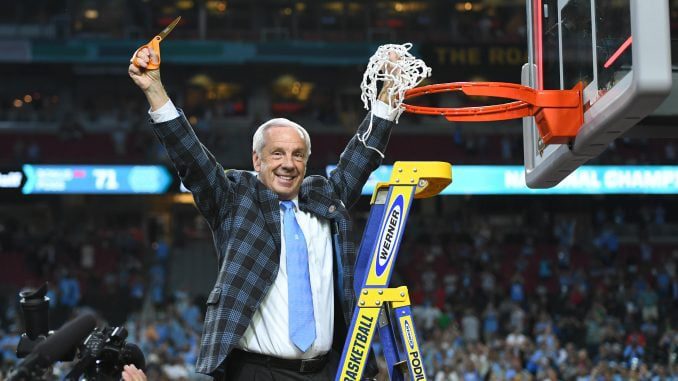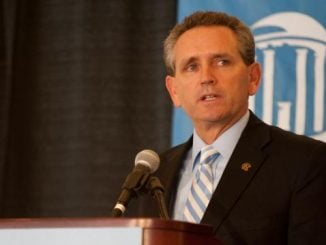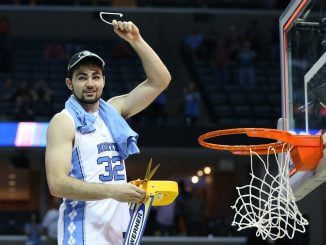
North Carolina raised its latest basketball championship banner to the rafters of the Smith Center at its annual Late Night With Roy event Friday night.
That’s not all the Tar Heels and their fans had to celebrate.
A few hours earlier, UNC scored a major and unexpected victory when the NCAA ended its seven-year investigation into the university’s African and Afro-American Studies program without issuing any sanctions.
In its report issued Friday morning, the NCAA’s Committee on Infractions determined that it could not conclude that UNC had violated its academic rules because the so-called “paper courses” in the AFAM program over an 18-year period were made available to the general student body, as well as athletes.
UNC was accused of five Level 1 violations, the most serious under the NCAA’s bylaws, as part of a seemingly neverending scandal that first came to light during the summer of 2010. Despite some harsh rhetoric from both sides and the national media the case came to an end with a whimper.
In the end, the NCAA agreed with UNC — though reluctantly — that the matter was out of governing body’s jurisdiction.
“After reviewing all the information available to the hearing panel, the hearing panel concluded that it is more likely than not that student-athletes received fraudulent credit by the common understanding of what that term means,” SEC commissioner and Committee on Infractions chairman Greg Sankey said during a teleconference shortly after the report was released. “It is also more likely than not that North Carolina personnel used the course to purposely obtain and maintain student-athletes’ eligibility.
“Those strong possibilities, however, are not what the hearing panel could use to evaluate whether academic violations occurred. The hearing panel had to rely on NCAA principle, which defers to the school’s academic policies. North Carolina maintained that the courses did not violate their academic policies in place at the time the courses were completed.”
Sankey said the findings in the Committee on Infractions’ report will be turned over to UNC’s accrediting body, the Southern Association of Schools and College, which has already sanctioned the university on this matter.
The only actual penalties levied by the NCAA committee were a five-year “show cause” placed on former UNC department chair Julius Nyang’oro and a reprimand for AFAM secretary Debra Crowder — neither of whom are affiliated with the university anymore. They were both found guilty of “unethical conduct” and “failure to cooperate” with the NCAA.
In the end, though, their primary roles outside the athletic department made it impossible for the NCAA’s most serious allegations against UNC to stick.
“Based on both information available in the record and the University of North Carolina’s support of the courses,” Sankey said, “the hearing panel could not conclude the university failed to monitor and lacked control over its athletics department.”
As could be expected, UNC officials were ecstatic about the favorable ruling and the fact that it signals an end to its ongoing battle with the NCAA.
“We believe this is the correct and the fair outcome,” chancellor Carol L. Folt said. “We’re grateful for the resolution of this case about issues that ended more than six years ago. Our focus is on continuing to deliver the best possible education to our students.”
Folt and athletic director Bubba Cunningham were both hired after the scandal first came to light in July 2010 when football player Marvin Austin posted a picture of himself drinking free champagne at a high-end club in Miami, a violation of NCAA rules that triggered an NCAA investigation and led to the football program being placed on probation.
Folt pointed out that UNC has made significant changes to its academic policies regarding athletes, many of which were recommended and approved by SACS.
Both Folt and Cunningham acknowledged that their school may have avoided serious NCAA penalties because of a technicality and that the public perception of Friday’s ruling will be that the Tar Heels got away with something. At the same time, though, they offered no apologies.
“We had some things that occurred that we haven’t been proud of,” Cunningham said. “Unfortunately, sometimes the behavior you’re not proud of just doesn’t quite fit into a bylaw or rule, and that’s what we’ve been talking about for five years. We’re not proud of the behavior, but we didn’t think it violated the (NCAA) bylaw and today, the Committee on Infractions revealed to us that they came to that same conclusion.”
Sankey’s disappointment over the NCAA’s inability to sanction UNC in this case were evident throughout his 42-minute conference call with the media, saying that his “panel is in no way supporting what happened” in Chapel Hill, adding that “what happened is troubling.”
Despite the outcome of the lengthy investigation — which encompassed six different reviews, three Notices of Allegations and millions of dollars spent on lawyers over seven years — Sankey said the time spent on the case was still worth it.
“It’s important because the serious nature of information initially informed this matter merited serious review,” Sankey said. “… Yet, the reality is that once we had the complete record, the destination is included in the report today.”
While that destination took most by surprise, UNC’s officials never wavered in their belief that the case would ultimately be decided in their favor.
“There were times when it was contentious and we had significantly different opinions on how the bylaws apply,” Cunningham said. “But I believe we got to the appropriate spot and I could not be more pleased for our student athletes and our coaches, nor could I be more proud of how they’ve conducted themselves in the last few years, given some of the trying times they’ve had.”
“I tend to believe that when the facts are out and the record is fully read, people will do the right thing,” Folt added. “In that way, that is what I believe happened. This is what I expected to be the outcome.”




